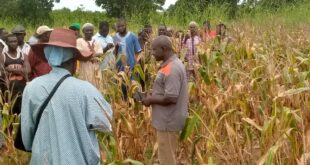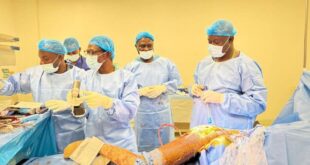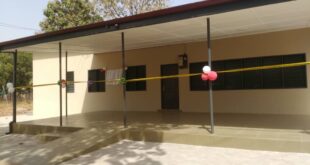Nyankpala, Ghana – Farmers in the Upper West and Northern Regions of Ghana have been schooled on appropriate agronomic practices to reduce crop production cost and improve agricultural output towards food security.
They were taken through crop rotation, use of animal droppings and appropriate fertilizer application aimed at boosting soil nutrients for good yield.
An Agronomist at the Council for Scientific and Industrial Research-Savanna Agricultural Research Institute (CSIR-SARI), Dr George Y. Mahama, took the farmers through series of practical activities during a visit to some demonstration fields in Wa.
He noted that rotating crops like legumes and cereals was an effective way of increasing nutritional value of the soil, and helped to reduce the cost of buying and applying fertilizers and the purchase of fertilizer inputs could lead to excessive cost of production and affect the economic status of many rural farmers.
The field visit was organised by CSIR-SARI with financial support from the GIZ flagship Market Oriented Agricultural Programme – North-West (MOAP-NW) and co-funded by the European Union, German Cooperation and Ministry of Food and Agriculture.
The MOAP aims at improving livelihoods of farmers in its operational zone – increasing agricultural production, production quality, boosting job creation and economic growth among the people.
The demonstration farms were to test the potential of poultry droppings in improving sorghum production and assess the effectiveness of crop rotation between sorghum and legume – groundnut and Soybeans.
It was also to test different varieties of groundnut drawn from different countries including; Nigeria, Burkina Faso and the USA which could withstand diseases such as groundnut rosertte and Leaf spot.
It could also enhance high yielding quality of the crops and fit for growing in the savanna ecological zone.
Dr. Mahama explained that failure of some farmers to follow proper agronomic practices was the leading cause of low yield and therefore urged farmers to take the training very seriously.
He noted that continuous cropping for instance did not only result in loss of soil fertility, but that it also caused infestation which affected crop yield and entreated farmers to rotate leguminous crops such as soybeans with cereals such as sorghum to maximise the nitrogen credit of legumes for better output.
According to Dr Mahama, information from the Food and Agriculture Organisation (FAO) indicated that soil depletion in northern Ghana contributed to low production but added that it could be improved with crop rotation using legumes.
He implored farmers to see farming as a business and follow appropriate farming practices to maximise the full potential of their activities to improve their living standards.
Some of the farmers expressed satisfaction about the exercise and pledged to pass on the knowledge received to their colleagues.
Source: GNA
 Savannah News Online Reporting Only What Matters Most
Savannah News Online Reporting Only What Matters Most



